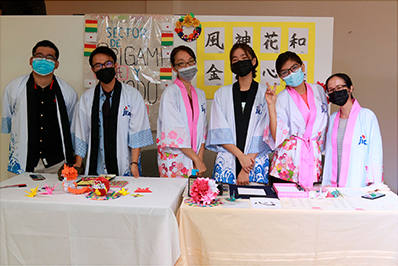(5) Culture and Sports
Cultural heritage that symbolizes a country can be effectively utilized as tourism resources to improve the livelihoods of the residents in the surrounding areas. On the other hand, a large number of cultural heritage sites are in danger due to the lack of funds, equipment, and technology among others, and hence assistance to protect such cultural heritage sites is required. The preservation and promotion of culture, including the invaluable cultural heritage in developing countries, should be addressed not only by the countries with cultural heritage in danger, but also by the entire international community.
With regard to sports, they can not only help maintain and improve health, but also contribute to cultivating a sense of respect for others, a spirit of mutual understanding, and normative consciousness. The influence and positive power of sports play a role as a “catalyst” for the development and growth of developing countries.
● Japan’s Efforts

Members of the Japanese Bolivian Nikkei Association’s National Volunteer Group promoting Japanese culture at “Anime Concert 2.0” through demonstrations of origami and “shodo,” Japanese calligraphy (Photo: JICA)
Japan has provided assistance for the promotion of culture, including sports, higher education, and preservation of cultural heritage in developing countries through the Cultural Grant Assistance Glossary since 1975. Facilities constructed with such assistance also serve as hubs for spreading information about Japan and for cultural exchanges with Japan, contributing to a deeper understanding of Japan and fostering a sense of affinity toward Japan. In 2022, Japan implemented 28 projects that support education, including Japanese language education, cultural heritage preservation, and sports under the Cultural Grant Assistance.
Moreover, Japan provides support for the restoration and preservation of cultural heritage, including equipment provision and preliminary studies and surveys, through the “Japanese Funds-in-Trust” established in UNESCO. Japan contributed approximately 300 million yen in FY2022 and has implemented multiple projects in the field of cultural heritage through the fund. In Japan’s assistance, a particular emphasis is put on human resources development in developing countries so that they themselves can preserve their own cultural heritage in the future. To this end, Japan endeavors to dispatch international experts, mainly Japanese experts, as well as hold workshops in order to transfer the techniques and expertise to developing countries. In addition to the support for tangible cultural heritage, Japan also supports the safeguarding of intangible cultural heritage such as traditional dances, music, handcraft techniques, and oral lore (oral traditions) through successor training, records conservation, and creation of safeguard mechanisms under the Japanese Funds-in-Trust.
Japan also conducts training programs with the aim of improving the capacities to protect cultural heritage by inviting young experts engaged in cultural heritage protection from the Asia-Pacific region to Japan as part of the “Project for the Promotion of Cooperation for the Protection of World Heritage and Other Cultural Properties in the Asia-Pacific Region.” In addition, Japan conducts biennial training on maintenance and repair methods for wooden buildings and on survey records of archeological remains. In 2022, Japan conducted training on 3D documentation methods for archaeological remains for experts of Viet Nam via videoconference.
Furthermore, Japan supports the field of sports using various programs including ODA and “Projects for Sports Diplomacy Enhancement,” in order to pass on the legacy of the Olympic and Paralympic Games Tokyo 2020 and to continuously promote “Sport for Tomorrow,” Note 74 Japan’s international contribution through sports that aims to share the value of sports and promote the Olympic and Paralympic Movement. Note 75 In addition, 50 Japan Overseas Cooperation Volunteers (JOCVs) were dispatched to developing countries in the field of sports in 2022.
Glossary
- Global Survivors Fund (GSF)
- Fund launched by Dr. Denis Mukwege and Ms. Nadia Murad, Nobel Peace Prize laureates 2018. It aims to facilitate access to reparations and support for survivors of conflict-related sexual violence against the backdrop that many of them do not receive public reparations. GSF conducts awareness-raising activities regarding the development of the judicial system to support and give relief to survivors.
- Cultural Grant Assistance
- Cultural Grant Assistance is a grant aid to procure equipment and supplies and to construct and rehabilitate facilities for the promotion of culture (including sports) and higher education as well as for the preservation of cultural heritage in developing countries. It aims to promote friendly relationships and mutual understanding by encouraging cultural and educational advancements in developing countries as well as cultural exchanges between Japan and the recipient countries through such assistance. There are two modalities; “Cultural Grant Assistance,” which provides assistance to governmental organizations of developing countries, and “Grant Assistance for Cultural Grassroots Projects,” which provides assistance to NGOs and local public entities for small-scale projects.
- Note 74: Sport for Tomorrow website: https://www.sport4tomorrow.jpnsport.go.jp/
- Note 75: MOFA’s sports diplomacy initiatives: https://www.mofa.go.jp/policy/culture/people/sports/index.html
